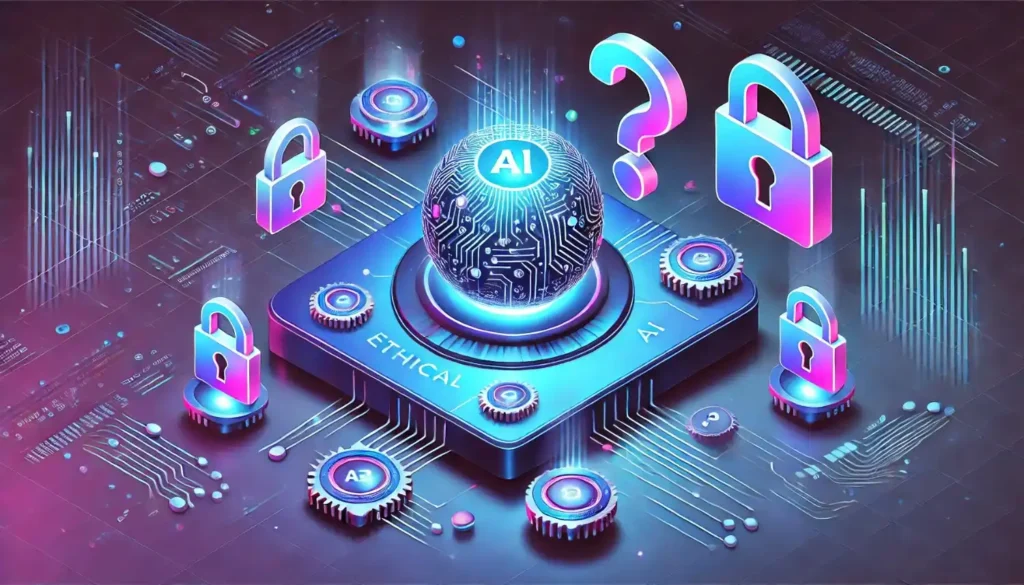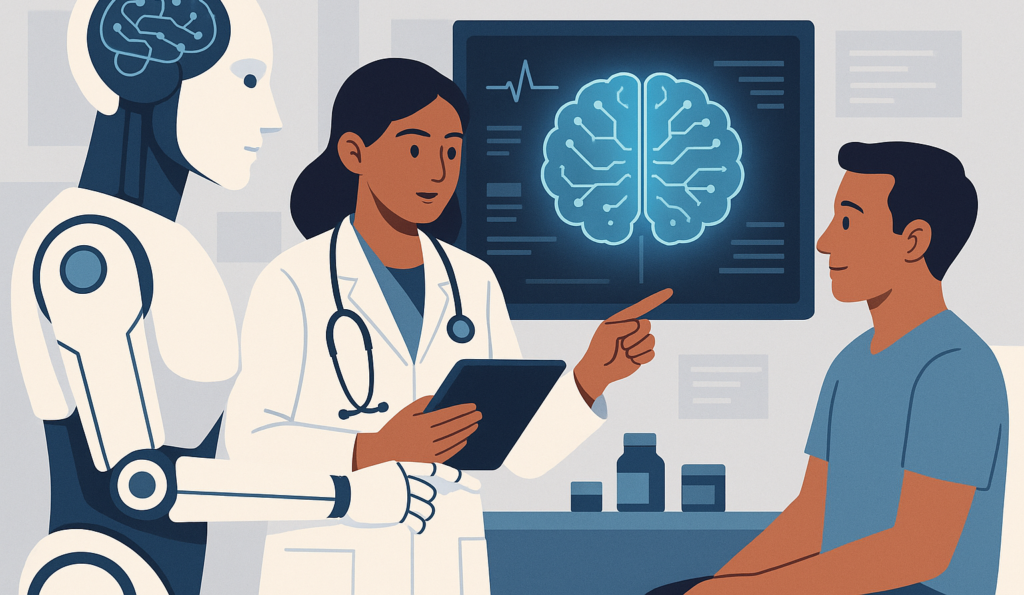Introduction: AI in Everyday Life: More Present Than You Think
AI in everyday life is no longer a concept of the distant future it’s already woven into the routines, habits, and decisions we make every single day. From the moment you wake up and check your phone to the way you commute, shop, or unwind with your favorite playlist, artificial intelligence is working quietly in the background. While it often operates invisibly, its impact is profound, changing how we live, work, and interact. But how often do we stop to consider just how deeply AI has integrated itself into our daily existence?
Thank you for reading this post, don't forget to subscribe!In this post, we’ll explore the transformative power of AI in not just through gadgets and apps, but through deeper societal shifts. With real-world examples, expert-backed insights, and a conversational tone, this article will help you understand the quiet revolution AI is bringing to your world.
The Invisible Assistant: How AI in Simplifies Daily Routines
To begin with, consider the simple act of checking your phone in the morning. It unlocks using facial recognition a feature driven by AI. As you scroll through your customized newsfeed, AI algorithms analyze your habits to deliver content that aligns with your interests. Furthermore, even email platforms use AI-powered spam filters to ensure your inbox stays clean.
Here are a few everyday tools quietly powered by AI
- Voice Assistants like Siri or Alexa respond to natural language and learn your preferences over time.
- Smart Maps like Google Maps use AI for real-time traffic predictions and rerouting.
- Streaming Platforms (e.g., Netflix, Spotify) use AI to personalize recommendations based on your behavior.
In essence, these aren’t just convenient features—they’re intelligent systems that adapt and improve with use.
Smart Homes and AI in Everyday Life: Comfort Meets Intelligence
Next, let’s step into our homes. Home automation has taken a giant leap with AI. From thermostats to vacuum cleaners, smart devices use AI to learn our routines and enhance comfort. According to a Statista report, the global smart home market is projected to exceed $200 billion by 2026.
Here’s how AI in everyday life is working behind the scenes:
- Smart Thermostats (e.g., Nest) learn your habits and automatically adjust temperature settings.
- Robot Vacuums like Roomba use mapping and AI to clean efficiently.
- Home Security Systems employ facial recognition and motion detection for better safety.
As a result, this automation allows more time and mental space for what really matters family, hobbies, or simply relaxing.
AI in Everyday Life on the Move: Transportation Reimagined
Moving outside the home, AI plays a pivotal role in transforming how we get from point A to B. Whether it’s your daily commute or a spontaneous trip, AI in is behind the wheel literally and figuratively.
- Ride-Sharing Apps (Uber, Lyft) use machine learning to calculate fares, match drivers, and plan efficient routes.
- Public Transport Systems in smart cities use AI to monitor congestion and optimize schedules in real time.
- Traffic Management is evolving too. Cities like Los Angeles use AI-controlled traffic lights to reduce bottlenecks and pollution (Forbes).
Consequently, these AI in everyday life innovations make travel faster, greener, and more efficient.
AI in Everyday Life and Your Health: Smarter Well-Being

Shifting focus to personal well-being, the healthcare industry is one of the biggest beneficiaries of AI in everyday life. From diagnosis to prevention, AI is making medicine more personalized and proactive.
- Wearables like Apple Watch track vital signs and detect abnormalities.
- AI-Powered Diagnostics can analyze medical images with incredible accuracy. For example, Google Health’s AI has matched dermatologists in identifying skin conditions (Nature).
- Telemedicine Platforms use AI chatbots to screen symptoms before appointments.
In my own experience, a family member was alerted to an irregular heartbeat by their smartwatch prompting a doctor visit that uncovered a treatable condition early. That’s the real-world power of AI in everyday life.
AI in Everyday Life at Work: Smarter, Not Harder
Moreover, while many fear that AI will replace human jobs, the reality is more balanced. In most workplaces, AI in everyday life acts as a powerful tool that enhances human capability rather than replacing it.
- Content Creation Tools like Grammarly or Jasper help polish writing and generate ideas.
- Project Management Software uses AI to forecast deadlines and allocate resources smartly.
- Recruitment Platforms use AI to screen resumes and match candidates but with caution, due to bias concerns.
Ultimately, by automating repetitive tasks, AI in everyday life frees up employees to focus on creativity, strategy, and innovation.
AI in Everyday Life and Consumer Habits: Shopping, Streaming & Spending

Furthermore, whether you’re browsing online or managing finances, AI is tailoring your experience:
- E-commerce Platforms like Amazon use AI to personalize your feed, manage inventory, and predict what you’ll want next.
- Banking Apps use AI for fraud detection and smarter customer support via chatbots.
- Streaming Services leverage viewing history to make eerily accurate recommendations.
A McKinsey study found that AI-driven personalization can increase sales conversion rates by up to 15% a testament to how effective AI in everyday life really is.
Ethical Considerations of AI in Everyday Life
However, AI in everyday life isn’t without flaws. Its decisions can reflect and amplify human biases, especially if it’s trained on skewed data. Facial recognition tools, for example, have been criticized for racial inaccuracies (MIT Media Lab).
Concerns include:
- Bias in Hiring Tools that disadvantage underrepresented groups.
- Lack of Transparency in algorithmic decision-making.
- Privacy Issues as AI systems collect and analyze vast amounts of personal data.
Therefore, it’s crucial to advocate for ethical AI development. Governments, tech companies, and users must collaborate to ensure accountability and fairness.
Why AI in Everyday Life Matters to You
Clearly, AI is no longer optional it’s essential. But while it enhances convenience, it also demands awareness. The choices you make from the apps you use to the data you share shape how AI evolves.
Key Takeaways:
| Area of Life | AI Use Case | Benefit |
|---|---|---|
| Home | Smart devices, voice assistants | Comfort & time savings |
| Transportation | Ride-sharing, smart traffic systems | Efficient commuting |
| Health | Wearables, diagnostics | Early detection, personalization |
| Work | Automation, productivity tools | Enhanced efficiency |
| Entertainment | Recommendations, personalization | Better user experience |
| Finance | Fraud detection, smart banking | Security & convenience |
Understanding how AI in everyday life influences your daily decisions gives you more control and helps you make smarter, more informed choices.
Final Thoughts: Embrace AI, But Stay Informed
As someone who has seen AI move from buzzword to baseline, I can confidently say: It’s here to stay. And while the benefits are exciting, they come with responsibilities.
- Stay curious. Learn how the tools you use work.
- Prioritize apps and services that value privacy.
- Be an informed digital citizen by questioning and challenging how AI impacts society.
After all, AI in everyday life isn’t just shaping our future it’s quietly reshaping our present. Let’s make sure it does so with our best interests at heart.
What Do You Think?
Have you experienced AI in everyday life making your world easier or more complicated? Share your story in the comments below. Let’s build a community that learns together.
Looking to explore more tech-driven insights? Check out our latest articles on digital transformation or subscribe to our newsletter for weekly updates!



